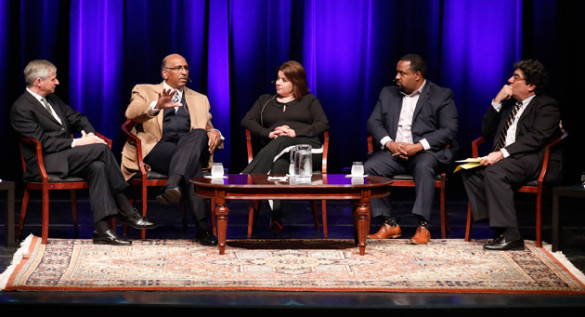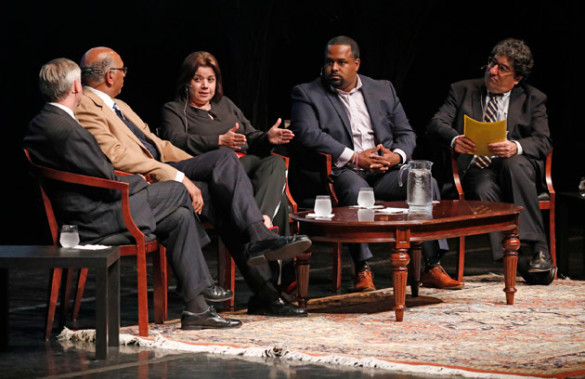
Eight years after Barack Obama’s historic election as the nation’s first African American president, are race relations better or worse in the United States? Chancellor Nicholas S. Zeppos convened a panel of political experts Tuesday evening to discuss that question, as well as President-elect Donald Trump’s extraordinary ascent to the presidency.
“We are trying to chart a path forward of understanding, discourse and dialogue,” Zeppos told the near-capacity crowd gathered in Langford Auditorium. The Jan. 17 event was part of the Chancellor’s Lecture Series as well as Vanderbilt’s 2017 Martin Luther King Jr. Commemorative Series.
“The response that most people would give is that we’re worse off on race,” said Joshua DuBois, who led the White House Office of Faith-based and Neighborhood Partnerships during Obama’s first term. “But the reason why I think this period has been an important step … is because the president held a mirror up to the American psyche, and we can finally see who and what we really are.”
DuBois likened it to an X-ray that’s revealed perilous fractures beneath the surface of American society.
“You can’t deal with an issue until it’s on the table,” he said. “We’ve had 350 years of really, really tough stuff in this country on race, and just around 50 or 60 years where we’ve begun to figure things out. So it makes sense that we needed this X-ray period.”
Michael Steele, former chairman of the Republican National Committee, agreed. Previous milestones in the struggle for racial equality—the March on Washington, Martin Luther King Jr.’s “I Have a Dream” speech, the Civil Rights and Voting Rights acts—were important but largely symbolic, he said.
“[rquote]Obama’s election pulled the Band-Aid off of a very old and deep wound. And over the last eight years, we’ve been living in the itch of that wound, and it has not been pleasant,” Steele said.[/rquote] “We discovered we weren’t as enlightened as we thought we were, we weren’t as progressive as we thought we were, and we weren’t as prepared as we thought we would be for this moment.”
Having a frank conversation about race is not comfortable, nor should it be, he said. “You are unwrapping 400 years of history, 400 years of attitudes and behaviors. … At the end of the day, Barack Obama is not the person who’s going to solve that with a great speech.” Rather, the solutions lie in our communities and our neighborhoods, he said.
In terms of expectations, Obama has shouldered a tremendous burden when it comes to race, said Republican strategist Ana Navarro. “But you cannot take away from President Barack Obama his legacy of being the first black president. And the fact that we broke that glass ceiling as a nation—as folks who do have racial divisions—is a huge, huge accomplishment of enormous significance,” she said.
In addition, the indelible image of an African American holding the highest office in the land is invaluable for younger generations. “What it means is that little black girls and little black boys all over the country know unequivocally that one day they can grow up to be president,” she said.
Jon Meacham, Vanderbilt Distinguished Visiting Professor and a Pulitzer Prize-winning presidential historian, noted that Americans have a tendency to “overcorrect.” Is the ascension of Donald Trump, seemingly Obama’s polar opposite, an extreme overcorrection by the American electorate?
Steele explained a large segment of Trump supporters this way: “You have this voter who basically has been sitting at home watching the world pass him by for the last 30 years,” he said. “Trump pulled that voter up off the couch. He brought that voter out of their funk and back into the system.”
Many have criticized the president-elect for deploying racially divisive, often xenophobic messages during his campaign. However, “Donald Trump didn’t put these ideas in the voters’ heads,” Steele said. “All he did was speak to them.”

“He basically took a movement and put the Trump brand on it,” Navarro said, “the same way that somebody else builds a building, and he puts the Trump name on it.”
Trump’s prodigious use of Twitter to communicate directly to the public, to undercut the media, and to wield influence on Capitol Hill will likely continue to confound our traditional expectations of the presidency, the speakers said.
“One of the things that fascinates me is he doesn’t drink, but he is the only person I know who drunk-tweets sober,” Navarro quipped.
But Steele believes this approach could work to Trump’s advantage. His spontaneous tweets contradicting established Republican policy often give him political leverage.
“One of the advantages that I think he has is the fact that he is so far outside the system he’s beholden to nobody. Let’s be honest—the man is not a Republican, he’s not a conservative in the traditional senses of those words. He didn’t come up through the system. He’s not beholden to anyone in the Capitol Hill Republican leadership; he’s not beholden to any Democrats either. So he’s free unlike any president we’ve had,” Steele said.
While his supporters admire this quality, Trump approaches Inauguration Day with historically low public approval ratings. Does he care, Zeppos wondered, and will his desire to improve his ratings motivate him to take positive action for the American people?
DuBois thinks yes on both counts. “He is market driven, he wants to win, and I think that’s the only thing that will keep him in check—the public’s view of him,” he said.
The speakers agreed that one of Trump’s biggest challenges may prove to be connecting with the American people by a more meaningful method than social media—namely, conveying his humanity in times of national crisis.
“He seems to me the president least inclined to seek or invoke the larger forces of a creator,” Zeppos reflected. “How does that play out, particularly in a Challenger shuttle disaster situation, or when he has to attend a public funeral to help the nation heal? Where is faith in the public sphere in a Donald Trump presidency?”
“I don’t see it. It’s not part of his nature or character that I’ve seen privately or that I’ve heard people speak of,” Steele said. “I don’t know how comfortable he is in showing that, and unfortunately for a president, you don’t get the warm-up. It happens, and you’ve got to be in the moment.”
“It’s an area where I desperately hope that he exceeds my expectations, because we need him to. There are going to be some really tough things over these next four years,” said DuBois, a former faith adviser to Obama who attended the public memorials for victims of the Sandy Hook and Charleston church shootings with him. “That’s when you need someone who’s more than a commander in chief, more than a political leader—someone of deep humanity who tries to connect his humanity with the humanity of the country.”